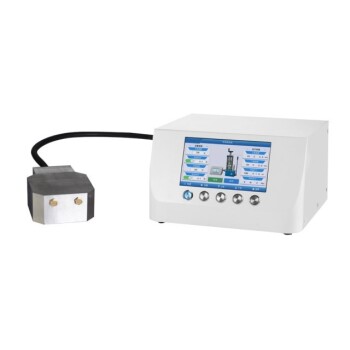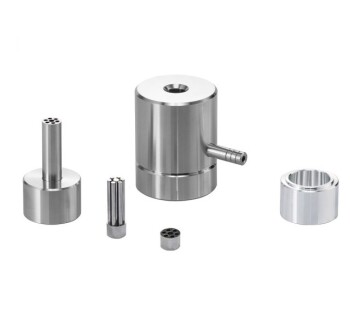To safely operate a laboratory hot press, you must implement a multi-layered protocol that addresses its core hazards: extreme heat, high pressure, and high voltage. Key precautions include wearing heat-resistant gloves, keeping all body parts clear of the press area during operation, ensuring the equipment is properly grounded, and restricting its use to fully trained personnel. You must also know the location of the emergency stop, ensure adequate ventilation, and never leave the machine unattended while it is running.
A hot press is an unforgiving combination of thermal, mechanical, and electrical energy systems. Effective safety is not a checklist to be memorized, but a deep understanding of these forces and a disciplined protocol to manage them at every stage of operation.

Deconstructing the Core Hazards
A hot press concentrates immense energy. Understanding where the danger lies is the first step toward mitigating it. Each hazard requires a specific set of precautions.
Thermal Hazards: Managing Extreme Heat
The most obvious danger is the high temperature of the platens, which can cause severe burns instantly. This hazard extends to the sample and mold assembly even after the cycle is complete.
Always wear heat-resistant gloves when handling molds, samples, or any parts near the platens. Never assume a part is cool; use caution and allow for adequate cooling time before removing your sample.
Mechanical Hazards: The Force of Compression
The hydraulic system generates tons of force. Any object, especially a body part, caught between the platens will be crushed.
Keep your hands and body clear of the press area once the cycle begins. Be aware of all moving parts. Furthermore, operating the press beyond its maximum pressure rating can lead to catastrophic failure of the hydraulic system or frame, creating a projectile hazard.
Electrical Hazards: The Power Behind the Heat
The press uses high-voltage electricity to power its heaters and controls. Faulty wiring or improper handling creates a significant risk of electric shock.
Ensure the machine is connected to a properly grounded outlet. Never operate the equipment with wet hands or in a wet environment. Report any frayed cables or exposed wiring to a supervisor immediately and do not use the machine until it is repaired.
Material & Chemical Hazards: What Goes Inside Matters
The materials you press can introduce their own hazards. Polymers, binders, and other composites can release toxic or flammable gases when heated, a process known as off-gassing.
Always operate the hot press in a well-ventilated area or under a fume hood, especially when working with new or unknown materials. Consult the Safety Data Sheet (SDS) for any chemicals, like potassium bromide (KBr) used in sample prep, to understand their specific handling requirements.
The Operator's Protocol: A Disciplined Approach
The machine's built-in safety features are only effective when paired with a vigilant and well-trained operator. Human protocol is the most critical safety system.
The Mandate for Training
Operating a hot press without a complete understanding of its function and hazards is unacceptably dangerous.
Access should be strictly limited to personnel who have received comprehensive, hands-on training. This training must cover normal operation, safety features, emergency procedures, and equipment-specific limitations.
Pre-Operation Inspection
Many potential failures can be caught before the machine is even powered on. A consistent pre-use check is your first line of defense.
Before every use, inspect the power cord, ensure hydraulic oil levels are adequate, and verify that any required cooling water lines are functioning. This simple habit prevents both equipment damage and safety incidents.
Active Monitoring: Never Walk Away
A hot press process can change unexpectedly. A thermal runaway, pressure fluctuation, or material failure can occur quickly.
Never leave a hot press operating unattended. Active monitoring allows you to intervene or perform an emergency stop if the process deviates from the set parameters.
Knowing Your Emergency Stop
When a failure occurs, your reaction time is critical. The emergency stop (E-stop) is designed to shut down all machine movement and heating instantly.
Before starting any operation, physically locate the E-stop button. Ensure it is unobstructed and you know how to activate it without hesitation.
Understanding the Common Pitfalls
Even experienced users can make mistakes. Being aware of common failure modes and temptations is essential for long-term safety.
Pushing the Limits vs. Equipment Longevity
There is often a temptation to exceed the manufacturer's specified temperature or pressure limits to achieve a specific material property. This is a critical error.
Operating beyond a machine's design specifications drastically increases the risk of catastrophic failure and voids the warranty. It compromises the structural integrity of the frame and the reliability of the hydraulic system.
Inadequate Ventilation: The Invisible Danger
Because the danger is not immediately visible like a hot platen, operators often underestimate the risk of off-gassing.
Fumes from heated polymers can be toxic, carcinogenic, or corrosive. Failing to use proper ventilation exposes the operator to long-term health risks and can damage other nearby equipment.
Neglecting Maintenance: The Slow Path to Failure
Small issues, like a minor hydraulic fluid leak or an intermittent temperature reading, can seem insignificant. Over time, these are often precursors to major failures.
Adhere to a regular maintenance and inspection schedule. A small leak can lead to a sudden loss of pressure, while a faulty thermocouple can lead to thermal runaway. Proactive maintenance is preventative safety.
Making the Right Choice for Your Goal
Your safety approach should be tailored to your specific application. A static protocol may not be sufficient for a dynamic research environment.
- If your primary focus is routine sample preparation: Create a standardized pre-operation checklist and follow it without deviation for every single run to build muscle memory and ensure consistency.
- If your primary focus is new material R&D: Conduct a formal risk assessment for each new material, paying special attention to its thermal decomposition properties and potential for hazardous off-gassing.
- If your primary focus is training new operators: Emphasize hands-on learning that covers not just the "how" of operation but the "why" behind each safety rule, including simulated emergency shutdown drills.
By treating the equipment with informed respect, you ensure both the integrity of your results and the safety of your laboratory environment.
Summary Table:
| Hazard Type | Key Precautions |
|---|---|
| Thermal | Wear heat-resistant gloves; allow cooling time |
| Mechanical | Keep body clear; do not exceed pressure limits |
| Electrical | Ensure proper grounding; avoid wet conditions |
| Material/Chemical | Use ventilation; consult SDS for chemicals |
Ensure your lab's safety and efficiency with KINTEK's reliable lab press machines, including automatic lab presses, isostatic presses, and heated lab presses designed for precise and secure operations. Contact us today to learn how our equipment can meet your laboratory needs and enhance your workflow – get in touch now!
Visual Guide

Related Products
- Automatic High Temperature Heated Hydraulic Press Machine with Heated Plates for Lab
- Laboratory Manual Heated Hydraulic Press Machine with Hot Plates
- Manual Heated Hydraulic Lab Press with Integrated Hot Plates Hydraulic Press Machine
- Automatic Heated Hydraulic Press Machine with Hot Plates for Laboratory
- Lab Heat Press Special Mold
People Also Ask
- What role does a heated hydraulic press play in powder compaction? Achieve Precise Material Control for Labs
- Why is a heated hydraulic press considered a critical tool in research and production environments? Unlock Precision and Efficiency in Material Processing
- What is a heated hydraulic press and what are its main components? Discover Its Power for Material Processing
- Why is a hydraulic heat press critical in research and industry? Unlock Precision for Superior Results
- What is the role of a hydraulic press with heating capabilities in constructing the interface for Li/LLZO/Li symmetric cells? Enable Seamless Solid-State Battery Assembly



















